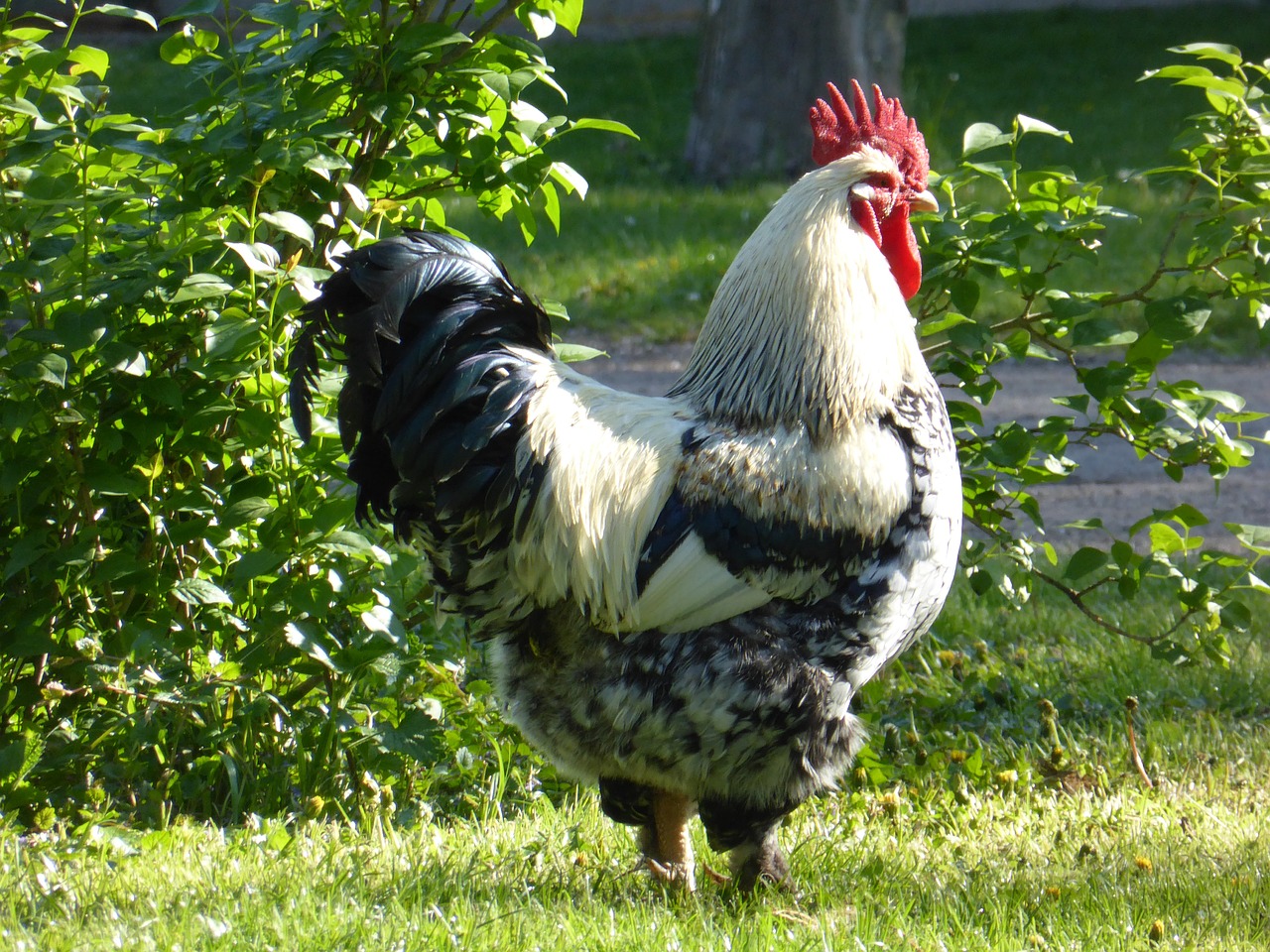Chickens and gardens are two things that go hand-in-hand. Like fall and football, peanut butter and jelly, peas and carrots – chickens and gardens complement each other quite well.
Not only are chickens a gardener’s best friend, providing plenty of free fertilizer and tiling services, but a good garden can also help support and nourish your flock of backyard chickens.
There are hundreds of plants that are well-suited to being grown around chickens, and even more that will help your chickens stay healthy.
Here are some of the best tips for growing a chicken-friendly garden – as well as the top 15 chicken friendly plants you need to know about.
Tips for Growing a Chicken-Friendly Garden
In general, most plants that are healthy for us to eat are also healthy for chickens to eat. If your chickens are already acclimated to eating commercial feed, you might want to wait until they’re used to grazing on forage until you introduce them to new plants.
Add a couple of new plants at a time, and also keep in mind these tips when you are providing your chickens with plants – or allowing them to graze directly in your garden.
Be Prepared for Unwanted Foraging Habits
If you decide to allow your chickens roam freely in your garden – rather than growing plants and tossing them into the chicken run – keep in mind that you are going to need to put up with some rather pesky behaviors when it comes to grazing.
For instance, chickens will eat freshly sown seeds and also pull up young, fragile seedlings. They will also build dust baths in newly tilled soil.
Chickens will even eat newly-set, immature fruits and strip some plants of their leaves and flowers.
Therefore, you will need to be careful about when and how you allow your birds to graze in your garden.
Make sure your chickens aren’t allowed at the plants until they have grown to the size that they won’t be easily destroyed by your hungry birds.
Build a Fence
Allowing your chickens to graze freely in the garden sounds like a great option – until a predator notices your chickens roaming around and decide to strike or your chickens decide to explore the neighbor’s garden, too.
Therefore, it’s a good idea to build a sturdy fence around your garden to keep your chickens in.
Aim for something at least two feet tall and keep in mind that some flightier birds might be able to fly over short fences, too.
I’d recommend picking up some simple poultry fencing and building something yourself to get the best bang for you buck.
[amazon box=”B000QCDE0K”]
Consider Separate Runs or Raised Beds
If you can’t let your chickens have full access to your garden, consider building a perimeter chicken run along the exterior perimeter of the garden.
This way, your chickens can help keep out grasshoppers, slugs, and other pests, and they’ll also have access to all the goodies that grow on the outskirts of the garden, too.
A raised bed is another option. If you have smaller chickens, they often won’t hop up into the beds unless tempted by a super-tasty looking slug – and then they’ll hop right back down.
This strategy will work only with certain types of chickens, but it’s absolutely worth a try.
[amazon box=”B087QT3ZJ2″]
15 of the Best Plants for Chickens
Here are 15 of our favorite chicken friendly plants:
1. Herbs
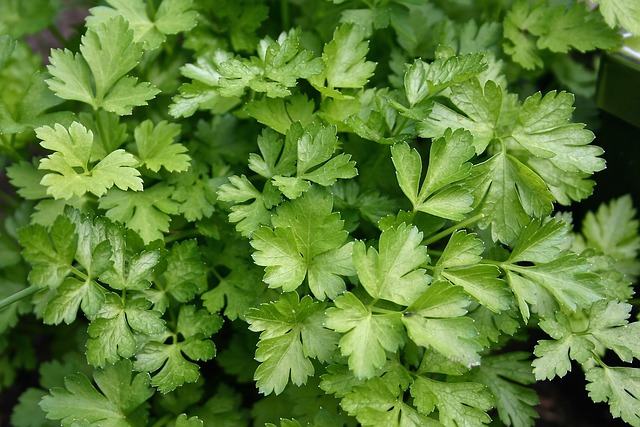
There are hundreds of herbs that can be grown for your chickens – many of which also have powerful medicinal benefits.
Not only will your chickens enjoy gobbling up these herbs, but you’ll notice a significant improvement in the overall health of your birds, too.
Comfrey: This perennial plant is rich in nutrients like calcium, potassium, and protein. It can help encourage healthy laying, too.
Thyme: Thyme not only smells good, but it also has significant antibacterial and antibiotic properties. It can also improve the respiratory health of your birds.
Sage: Sage is an excellent herb for supporting the overall health of your chickens. It serves as an antioxidant and can even help to prevent salmonella!
Oregano: Oregano is often considered a “miracle herb” because it has so many benefits. Not only can it help fight e.coli, salmonella, coccidiosis, and avian flu, but it is being studied as a broad-spectrum natural antibiotic on large poultry farms.
Wormwood: Wormwood is a phenomenal plant when it comes to repelling external parasites. It can keep airborne pests away, too.
Rosemary: Rosemary also has medicinal benefits and produces a strong aroma that can keep insects away.
Lavender: A natural insect repellent, you will likely see fewer pests around if you plant lavender for your chickens. It can also calm your birds and freshen the air near your coop.
Fennel: Fennel is a gorgeous plant that not only produces seeds and foliage that support your chickens’ overall health, but also put on elegant lacy pods of yellow flowers. These flowers attract beneficial pollinators and provide another food source for your chickens – bugs!
Mint: Mint is a great insecticide and also can keep rodents away. Any of the mint varieties (including catmint, peppermint, and spearmint) can be fed to chickens.
Nettles: Chicken sometimes won’t touch nettles growing in the chicken run if they’re too prickly, but you can always boil them down to feed to your chickens afterward.
Lemon balm: Lemon balm can eliminate stress among the flock and even help keep rodents away.
Parsley: Parsley has a ton of vitamins and minerals (and is even a rare source of the much-needed vitamin K). It’s also a great stimulant for laying hens.
Dill: Dill helps to prevent respiratory illnesses and can be fed fresh or dried – or you can simply let the plants grow wild in your chicken yard.
Basil: Basil is a popular culinary herb, but it’s also a great one to feed to chickens. It has powerful antibacterial properties that can help keep disease away.
2. Amaranth
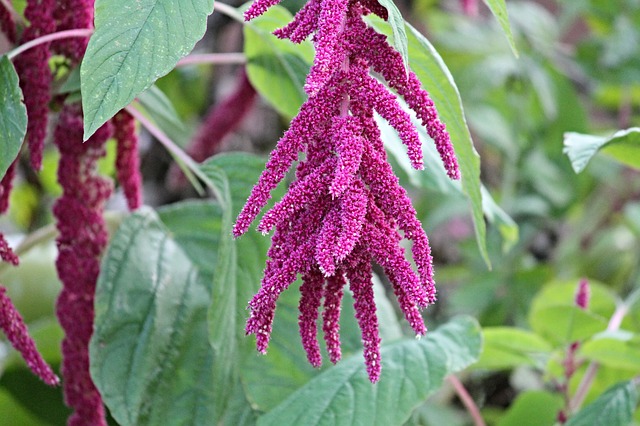
Amaranth is a grain that produces gorgeous flower spire up to 10 inches tall. It’s tall, edible leaves are purple and green, giving your chicken’s garden a gorgeous appearance as well as serious functionality.
It has bright seeds and lush leaves that contain all the healthy carbohydrates your chickens need.
3. White Clover
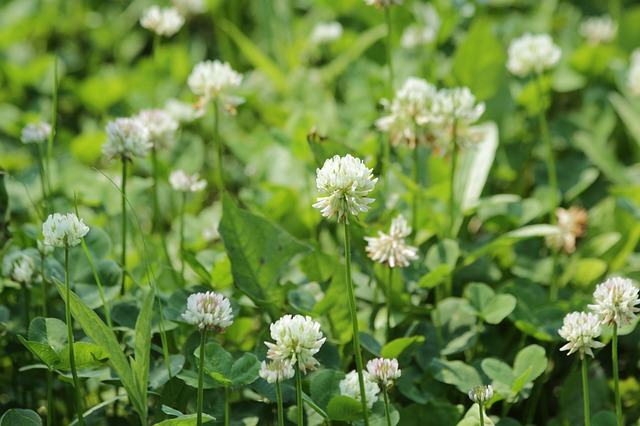
White clover is a fantastic living mulch, making it one of the best ground cover crops you can grow near your chickens.
White clover is not only high in protein, but it can also withstand foot traffic with ease.
It bounces back easily after chickens have stepped all over it – and even munched on it. It’s a great way to supplement their feed, too.
4. Sunflowers

Chickens love munching on sunflowers.
Not only will the seeds give you a delicious treat, but they are a great source of nutrients for your birds, too. Plus, sunflowers look great in a garden and are relatively hardy, requiring minimal care.
You can either grow sunflowers right in your chicken pen or grow them outside of the reach of your chickens to allow the seed heads to fully develop.
Once the flowers have blossomed, you can cut the heads down, dry them, and feed the dried seeds to your chickens. They’re a great source of healthy fats, protein, and omega-3s.
5. Garlic
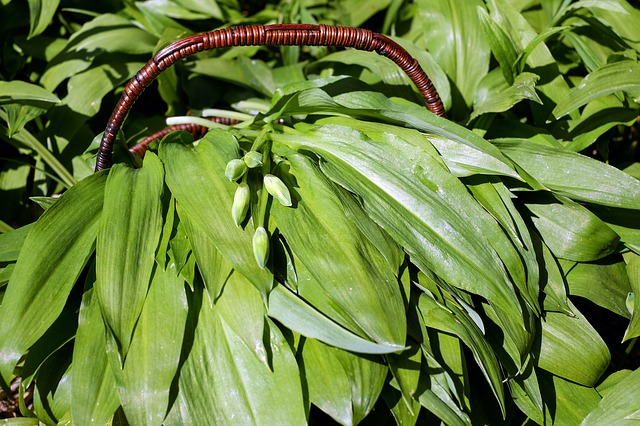
Garlic is one of the best foods you can feed your chickens.
It serves as a phenomenal immune system booster and has tons of other health benefits, like repelling internal and external parasites, too.
You can feed it to your chickens minced or you can simply allow them to munch on the stalks and bulbs. It is usually planted in the fall, so make sure your chickens can’t get to it until it is mature.
6. Cucumbers
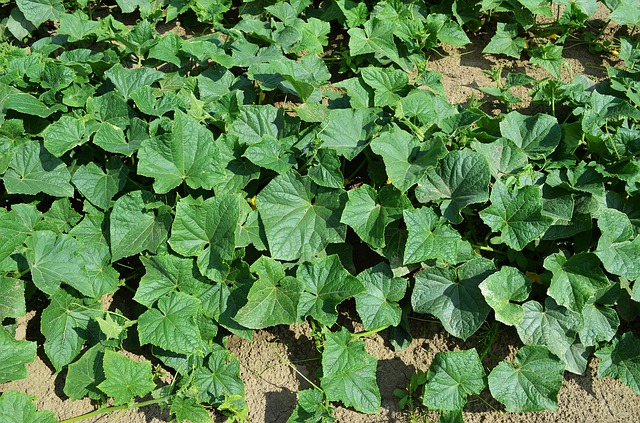
It takes a lot to kill cucumbers. Not only will your chickens nibble at the vines (they may occasionally shy away from some of the more bristly varieties) but they’ll love eating the fruits, too.
It will take days for a chicken to nibble down a full gourd! In addition to the hydrating benefits of feeding your chickens cool cucumbers in hot weather, cucumber seeds can also help reduce the likelihood of intestinal worms.
7. Corn
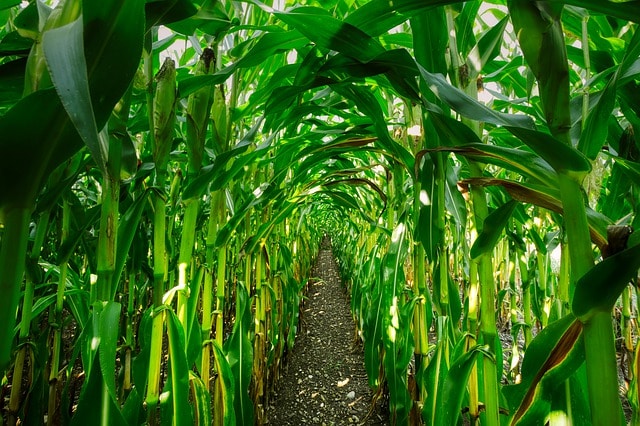
Corn is included in just about every type of chicken feed, so growing it for your chickens specifically can be quite advantageous.
Sweet corn tends to be best, so consider adding a row or two in your garden that will be fed solely to your birds.
Either dry the kernels or feed the chickens straight from the ear – they usually won’t munch on the cobs, though.
8. Dandelions
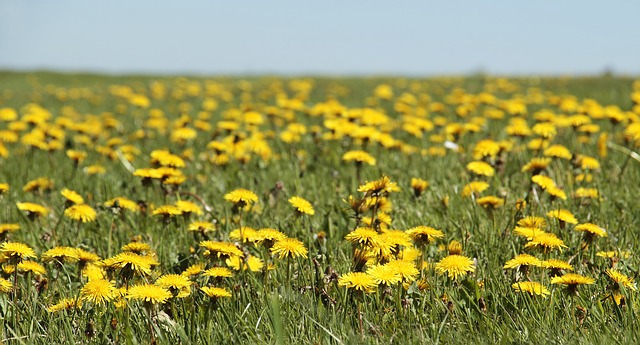
Don’t apply that herbicide to your lawn just yet – although most humans abhor dandelions, chickens love them.
This nutritious weed lives in just about every area of the country and can be cultivated or allowed to grow wild.
It grows best in wet soils and partial shade, and will grow for a vast majority of the summer.
9. Beets
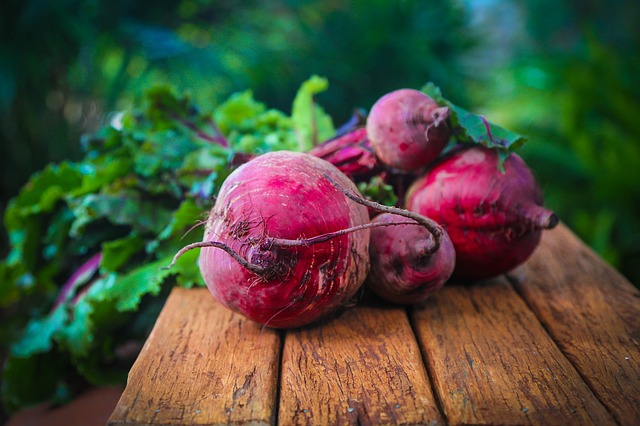
Beets are one of the best plants you can grow for your chickens. Not only do they mature quickly, providing you with a crop in a matter of mere weeks, but they are also super versatile.
Your chickens can eat both the root crop and leafy greens, too. Beets do a nice job of cleaning the blood and digestive tract of your chickens, and your birds will eat the entire thing.
10. Berries
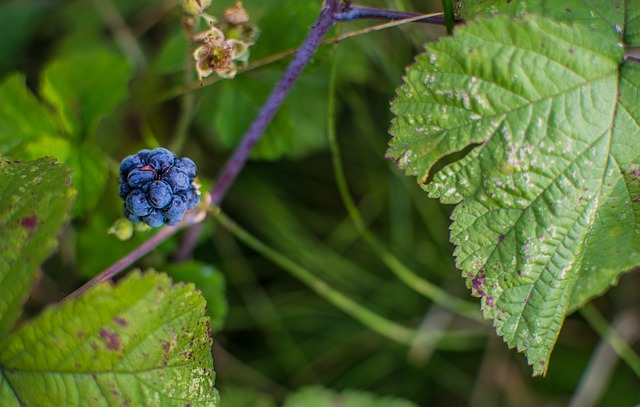
Like humans, chickens love berries. Berries can be quite costly to purchase on a regular basis, but berry bushes are shockingly easy to grow.
In fact, you probably already have some wild bushes growing somewhere on your property.
You can feed your chickens any kind of berry, including blackberries, raspberries, and blueberries, but one particularly good berry option is the strawberry. These grow well all over the place, usually popping up in the spring months.
Your chickens will eat the whole plant but especially love the ripe, juicy berries. They will even eat berries that have gone soft.
11. Leafy Greens
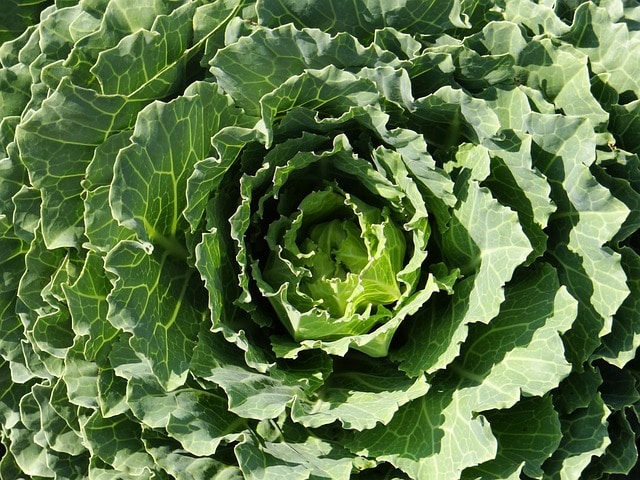
Leafy greens of all kinds are super healthy and will be a favorite of your backyard flock. You can harvest most leafy greens continuously throughout the growing season. Some good options to consider? Swiss chard, kale, cabbage, romaine, collards, and spinach.
Swiss chard produces leafy growth that will easily satisfy the appetites of your chickens. They usually won’t eat the stem, but will instead peck at the leaves. Often, you can grow multiple crops of Swiss chard in a chicken pen for this reason.
One word of caution when feeding chickens greens like Swiss chard and spinach, however -both of these contain small amounts of oxalic acid, which can cause calcium deficiency in high amounts. Therefore, you should feed them only in moderation.
Kale is another popular choice. It’s high in calcium, vitamin A, and other nutrients, making it a good source of vitamins and minerals for your chickens. It does best in cool weather and will produce multiple crops during the growing season.
Mustard greens, like kale, grow best in cool areas. These greens are nutrient-dense and tend to attract bugs that your chickens will enjoy eating, too.
12. Peas
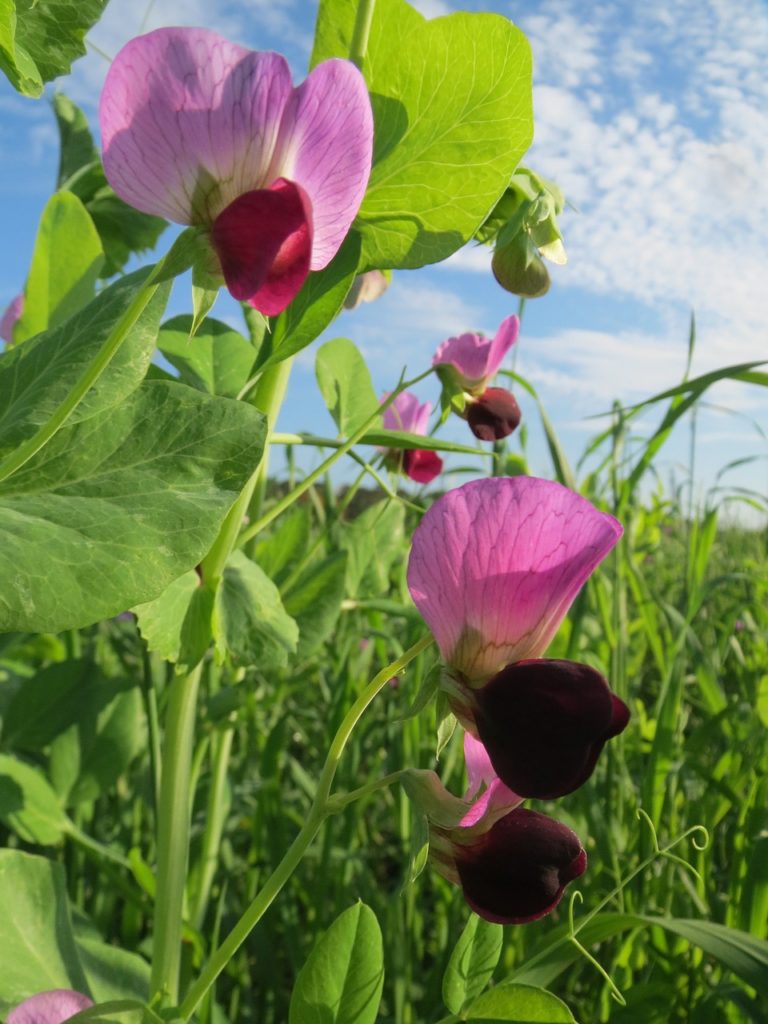
Chickens love peas, and since they mature in the early spring, they’ll provide delicious bite-sized treats for your chickens when little else is available.
Peas provide niacin, which your chickens need to develop strong, healthy bones.
You can feed your chickens beans, too – just make sure you avoid feeding uncooked dry beans, as these contain hemagglutinin and can be toxic.
13. Pumpkins
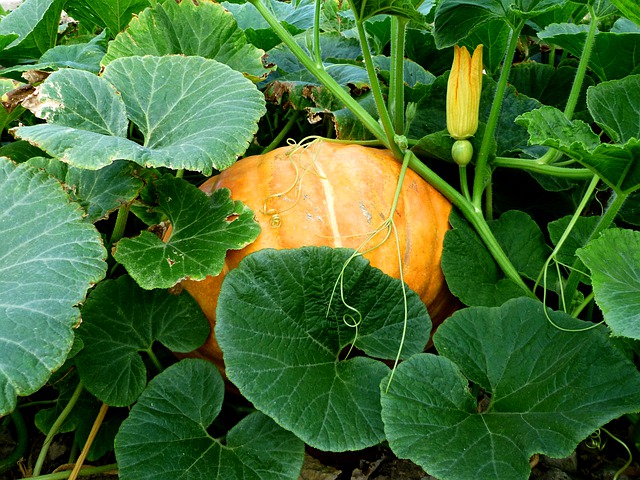
Chickens will eat every piece of a pumpkin as long as you cut it open for them first.
Pumpkin seeds are a great natural dewormer, but the flesh and rind have plenty of health benefits, too.
Plus, your chickens will love the taste and pumpkins provide important sources of antioxidants and beta carotene.
Pumpkins, like cucumbers, melons, squash, and zucchini, are part of the Cucurbitaceae family. All of these vegetables are excellent sources of nutrition, hydration, and natural deworming ability.
Most can also be cured and stored throughout the winter months!
14. Nasturtium
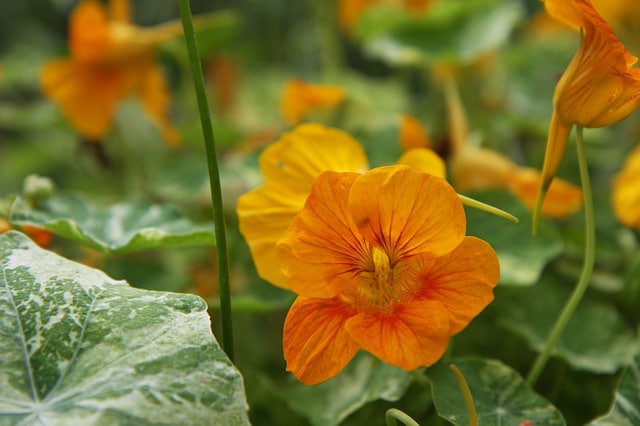
Nasturtiums are super easy to grow from seed, and will not only dress up the appearance of your chicken yard but will provide a ton of other benefits to your flock, too.
Chickens love nibbling on the seeds and flowers of these plants, and they also serve as a natural dewormer.
15. Melons
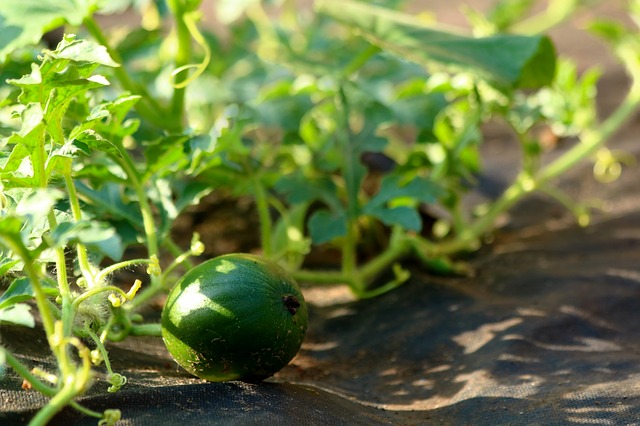
Chickens love all types of melons. You can feed your flock melons like watermelon, cantaloupe, honeydew, and more.
These fruits provide your chickens with lots of hydration during the hot summer months.
One of the best kinds of melons you can grow for your chickens is watermelon. If you grow watermelon in your garden, your chickens will devour the entire thing – seeds, rind, flesh, and all.
You might have to crack open the fruit for them, however, as they sometimes have a hard time penetrating through the shell.
What Plants Should I Avoid Growing Near Chicken?
While chickens can tolerate – and even benefit from – almost every plant, there are a few that you will need to be careful about planting near your chicken yard.
Luckily, chickens are pretty good at sensing which plants are bad for them and will have toxic effects.
Their intuition will keep them away from most poisonous plants – but not always. There are always some chickens who will be the exception to this rule.
Therefore, if you are planting near a coop or in your chicken run – or simply allowing your chickens free access to all the plants you have growing on your property – you will want to steer clear of these plants:
- Daffodils
- Foxglove
- Hydrangea
- Rhododendron
- Nightshade plants (including tomatoes, eggplant, and potatoes)
- Honeysuckle
- Daphne
- Tulips
- Oak (the acorns are toxic)
- Avocado
- Azalea
- Amaryllis
- Poison ivy
- Rhubarb
- Onions (can affect the taste of the eggs)
What Are the Benefits of Growing Plants Near Chicken Coops?
Still not convinced that you should be planting a chicken garden? Here are some of the benefits that growing chicken-friendly plants can provide.
Greater Nutritional Variety
The biggest and most obvious benefit of providing your flock with chicken-friendly plants is that they will be exposed to a greater number and variety of nutrients than if they were fed commercial chicken feed alone.
While most commercial blends are formulated to have all the nutrients your chickens need, nothing feeds an animal better than Mother Nature herself.
Debugging
Chickens love eating bugs – that’s no secret. And they’ll eat bugs at all of their various life stages, including as larvae, adult, and even eggs. If you let your chickens graze on plants in an area where there is a pest problem, you’ll find that you not only get rid of the pest but have also fed your chicken a healthy snack in the meantime.
Mulching
Chickens like turning up the soil, and if you place them in an area that needs to be mulched, they will happily spread the mulch for you as they scratch in search of bugs.
Tilling
Don’t spend hours tilling the soil in order to plant your chicken-friendly plants! Instead, let the chickens earn their keep and do the work for you. Leave your chickens in any one space long enough, and they’ll kill for you.
Fertilizing
Most people know that chickens produce an excellent source of fertilizer – put chickens out on pasture or in your garden and they will naturally fertilize the soil with their manure. The best advice is to have them do this a few months before you intend to plant so you don’t have to worry about them burning your plants with the heavy load of nitrogen.
Composting
If you have a compost pile, move it to where your chickens have access to it. Your chickens will scratch through the compost, turning and aerating it as they look for bugs and tiny microorganisms. Not only will they oxygenate the pile for you, but they’ll be adding the necessary nitrogen to it, too.
Should I Grow a Chicken-Friendly Garden?
According to the principles of permaculture espoused by many gardening and homesteading experts, each element of your property should serve a purpose. Nowhere is that truer than in the garden!
Free-range chickens who are allowed to munch on chicken-friendly plants will not only benefit in terms of greater nutritional uptake, but they’ll also give back to your garden, producing a variety of important functions like fertilizing and tilling.
You can accomplish more in a smaller space – and that’s a win-win for everyone.
